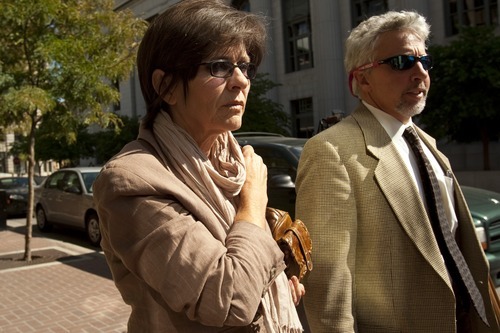This is an archived article that was published on sltrib.com in 2012, and information in the article may be outdated. It is provided only for personal research purposes and may not be reprinted.
A judge has found that federal authorities who busted a Blanding couple for illegal artifacts trafficking used "unreasonable" force by deploying more than 100 agents to the home for the arrest.
U.S. District Court Judge Ted Stewart on Tuesday dismissed most claims in the wrongful-death case brought by the estate of James Redd, the Blanding doctor and American Indian artifact collector who killed himself the day after his 2009 arrest.
But Stewart said the number of "heavily armed" agents was unreasonable and fair game for a continued lawsuit seeking damages for alleged wrongful death and intentional infliction of emotional distress.
"Dr. Redd was not accused of a violent crime, was not known to be dangerous or living with dangerous people, and nothing suggested that evidence would be destroyed unless a large force was dispatched," Stewart wrote in his ruling against the government's request to dismiss the case entirely.
Redd, 60, was snared in Operation Cerberus, the Bureau of Land Management investigation that used undercover operative Ted Gardiner to arrange purchases of ancient relics taken illegally from federal or tribal lands in the Four Corners region. The case ended in two dozen arrests — most leading to guilty pleas and probation — and in Gardiner's own suicide.
Redd's wife, Jeanne, also was arrested and pleaded guilty to selling a bird effigy pendant that she acknowledged was worth more than $1,000. That admission led to Stewart dismissing one of her family's claims against the government: that agents directed Gardiner to inflate the price beyond the $500 felony threshold found in federal archaeological protection law.
"The court finds that Jeanne Redd's admission that the pendant was worth $1,000," Stewart wrote, "makes it implausible that Gardiner, at least in this instance, employed a fraudulent method of valuation in declaring that the pendant was worth $1,000."
The judge also dismissed claims that the agents violated Redd's constitutional rights by pulling him from his car at gunpoint; interrogating him for four hours in his garage; telling him he could lose his medical license; or confiscating artifacts and belongings including journals and legally owned artifacts.
But the lawsuit may progress because, Stewart wrote, "the overwhelming show of force alleged was a serious intrusion into Dr. Redd's privacy, and it is not clear to the court that a governmental interest justified its use."
The Redd estate's attorney, Shandor Badaruddin, did not immediately return a call seeking comment. The U.S. Justice Department, which had sought a full dismissal, did not comment Tuesday. Nor did the BLM's Utah office, which oversaw the raid.
Twitter: @brandonloomis



